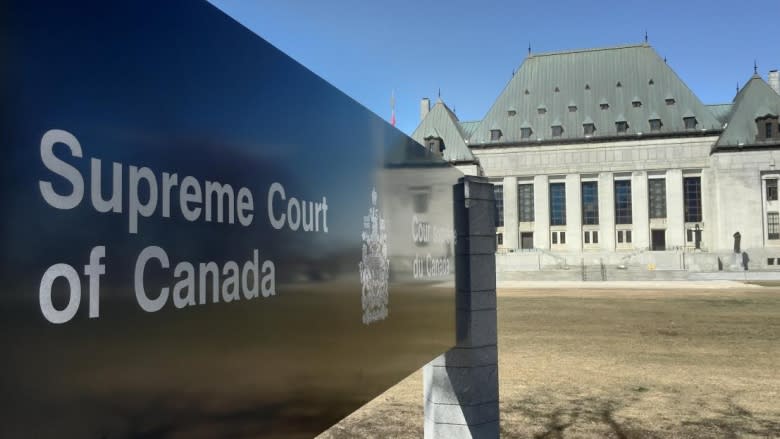Defence lawyers urge Supreme Court not to waver on steps to tackle justice system delays

Defence lawyers urged Supreme Court of Canada justices today not to tinker with their controversial ruling that imposed strict timeframes to ensure an accused criminal's right to a speedy trial.
Michael Crystal, a lawyer for alleged drug trafficker James Cody, told the top court in Ottawa that Canada's criminal justice system has been broken for many years, and last July's Jordan decision takes strong steps to fix it.
That split 5-4 judgment said criminal trials at Superior Court must be wrapped up within 30 months, and that cases in lower provincial courts should take no longer than 18 months.
Crystal called the ruling an "aggressive step forward" that adds clarity and addresses chronic court delays.
"By setting presumptive ceilings and subtracting defence delay, Jordan forces Crown prosecutors and defence lawyers to abandon their silos and Cold War posturing so that they, and not judicial officers, are the ones to resolve disputes," he said.
Fellow defence lawyer Frank Addario said despite coverage in the mainstream media raising the alarm about the fallout from the Jordan decision, the timeframes are working as envisaged and there has been no "massive upheaval" as a result.
Croft Michaelson, representing the Public Prosecution Service of Canada, said the system must have flexibility to account for unforeseeable circumstances that can cause delays.
In the Cody case, there were many complexities, including confidential informants with security requirements, sweeping disclosure obligations and a vast number of warrants.
Legal experts say today's case could ultimately fine tune the Jordan decision, which has been criticized for allowing people accused of a crime to walk free without trial.
Provinces hope the case will give them more wiggle room when it comes to wrestling with clogged courts and chronic delays.
5 provinces present arguments
Representatives from British Columbia, Alberta, Manitoba, Ontario and Quebec made arguments for greater flexibility with timelines to deal with unforeseen circumstances and complexity to ensure each case is given due diligence.
Trevor Shaw, a lawyer for B.C.'s Attorney General, said not all of the issues raised in Jordan can be addressed by increased resources, and warned of the dangers of "rushing" through the process without enough knowledgeable and experienced people working on the case.
"When you're dealing with confidential informants, if you make a mistake, the consequences can go all the way up to the death of that informant," he said.
Cody, an accused drug trafficker from Newfoundland, has argued his charter rights were violated when he had to wait five years for a five-day trial.
His case reaches the top court as public frustration mounts over the controversial Jordan decision, where the Supreme Court stayed drug charges against Barrett Richard Jordan after he waited 49 months for a trial.
Since then, there have been cases tossed out for taking too long to reach trial, including murder and assault charges.
"There's no question that Jordan has been a bit of an earthquake," said University of Ottawa law professor Carissima Mathen.
Prosecutors and provinces have said it's unreasonable to hold parties to timelines on past cases that weren't previously in place.
Benjamin Perrin, a University of British Columbia law professor, called it a "fortuitous opportunity" to revisit the transition rules around cases that were already in the pipe when the Jordan decision came down.
Confusion, consternation
"Those have been the source of a great deal of confusion, consternation, and varying decisions and inconsistent practice in terms of how to apply this new test on cases that were already in the system," he said.
Lawyers and judges have been baffled by rules that were vaguely spelled out, Perrin said, and the Cody case gives the high court a chance to clarify.
He said there is also a long-shot chance one judge could flip on his or her previous position, which would have the effect of the court overturning the Jordan ruling.
"All it takes is is one judge. I am quite sure the four judges who dissented in the case have not changed their minds, if anything that has happened post-Jordan bears out their criticism," he said.
Impact on victims
Perrin believes one of the major problems with the Jordan decision is that it did not consider the severity of the crime or the impact on victims.
Stephen Coughlan, a law professor at Dalhousie University in Nova Scotia, does not expect Supreme Court justices will reverse course on their earlier ruling.
"There's no reason for the court to do anything differently this time, in its very first case after Jordan was decided," he said. "The court should, most of the time, simply be applying the existing law rather than rewriting that law."
Coughlan said over time there will be more clarity over what could constitute a defence-caused delay or considered an exceptionally complex case, for example when there are several co-accused.
The federal government has been under pressure to help the provinces tackle the court delays to ensure cases aren't tossed out due to unreasonable delays.
Appearing before the Senate legal affairs committee in March, Justice Minister Jody Wilson-Raybould said the Cody case will consider the "framework" laid out by the Jordan decision.
"We will be following that very closely," she said.
After a two-and-a-half-hour hearing the court adjourned and reserved judgment.

 Yahoo Finance
Yahoo Finance 